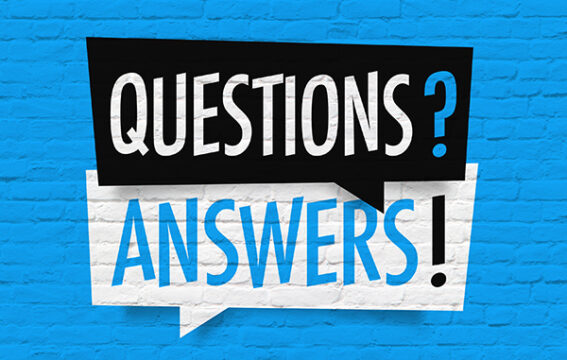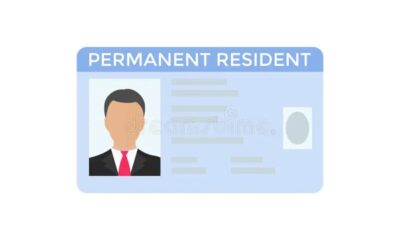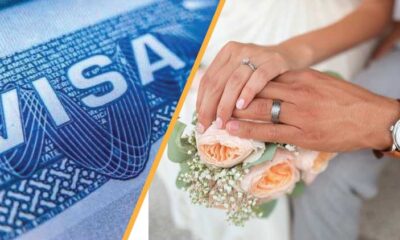Travel
Student Visa: F1 Visa Interview Questions And Answers For Students 2023

All F1 visa interview questions and answers verify your student status. Check out all 2023 F1 Visa Interview Questions and Answers.
When admitted to US universities, a Visa Interview can dampen excitement. People nationwide have described being grilled by the interviewer. It is important to understand that their purpose is not to reject applications. Their sole function is to verify your reasons for travelling to America. They are not trying to hinder you from reaching US goals unless you plan to stay illegally.
US student visa interviews are essential but they don’t last long. It usually takes 3–4 minutes (possibly less). Contrary to popular belief, the Visa Officer rarely reviews all your documents. Do not provide them without been asked. You should bring the relevant documents in case.
This article will try to correct certain visa interview myths, lists basic dos and don’ts, and provides F1 visa interview questions and answers. When applying for an F1 study visa, it provides USA study visa information. Like any interview, each situation is distinct. The most important thing is confidence and a solid purpose.
A formal conversation between two or more people is always an interview. It requires the same amount of preparation for this encounter. Before questioning begins, remember these steps to guarantee a successful event. Research is a key to success.
Here are some things to know before your US Student Visa interview:
- Make sure that all relevant documents are organized in an orderly fashion for the interview. (Refer to the list of documents to bring.)
- Refresh your memory on the admission essay or statement of purpose to the universities and courses you applied to.
- Look over the course you’re enrolled in, including its credit system, tenure, faculty, and highlights. Analyze why you chose that particular university.
- Do some research on the state you’ll be visiting and the university’s background, along with its nearby locations.
- Review your financial documents to understand how you’ll be paying for education in the United States.
F1 Visa Interview Documents
When filing for an F-1 Visa interview, it is critical to be prepared with the relevant documents. Personal information, academic and professional background, and financial records should all be included in these documents. There is an extensive list of documents available for examination. It is best to have all of the necessary documents prepared ahead of time.
Personal Documents for F1 Visa
- Passport
- DS 160 Confirmation Slip
- SEVIS Fee Receipt
- MRV Fee Receipt
- Visa Interview Appointment Letter
- Passport Size Photograph
- Educational Documents for F1 Visa
Academic Transcripts
- PTE / TOEFL / IELTS scorecard
- Bachelor’s Degree/ Provisional Degree Certificate
- GRE / SAT / GMAT scorecard
Professional Documents for F1 Visa(if applicable)
- Relieving Letter
- Joining Letter
- Salary Slips of the last six months
Financial Documents for F1 Visa
- Loan Approval Letter
- Bank Account Statement
- Income Tax Returns for the last 3 years
- Fixed Deposit Certificates
- Property Documents (residential, commercial, ancestral, and/or farmland)
How to dress up for an F1 Visa Interview?
It is important to consider what to wear when preparing for an F1 visa interview. A suitable outfit can make a significant difference in making a favorable impression on the interviewer.
The interview begins when you meet with the interviewer, and your first impression is typically established by your clothes. As a result, before the scheduled day, carefully analyze your outfit and keep the following aspects in mind.
Preserve an air of formality while avoiding excess:
- The formal dress code for men often consists of a shirt and trousers, however for ladies, it could be a similar look or traditional wears like an Indian formal costume, such as a sari or salwar kameez. When choosing your outfit, keep the weather in mind; for example, in the heat of June, you don’t need to wear a full suit, but instead pick for a simple shirt and trousers.
Opt for a palette of either light or solid tones:
- During summer, opt for pastels instead of fluorescents for an interview. Solid hues are more suitable for winter interviews. Refrain from wearing garments with prints, as they could be a distraction.
Keeping it Simple:
Rather than overloading yourself with accessories, it is better to keep it simple. Stick to the basics, and you will be able to look put together without being weighed down.
- It is wise to limit the number of accessories you wear
- Long necklaces, danglers, and noisy bangles are not suitable for women
- If you need to wear jewelry for religious reasons, try to restrict the amount to the least possible – anklets without sound are recommended
- Men should avoid wearing large bracelets or jingling chains
Ensure your attire is freshly laundered and crisply pressed:
- Sitting around before your interview can take some time, so it’s wise to choose clothes that don’t crumple quickly. Of course, it’s important to look neat – disheveled attire is not the right way to make a good impression.
Be sure you don’t give off any scent – either good or bad!:
- Wearing deodorant or mild talc is essential to avoid making a terrible impression with body odor. You should, however, avoid wearing strong colognes or fragrances because the Visa Officer may be allergic to them. You don’t want them sneezing or, worse, feeling uneasy because of the smell during the interview.
Wear glasses if the same is in your passport:
- If your passport has a photo of you wearing glasses, you should put them on when traveling.
- However, if you usually wear contacts, you can still do so.
Do’s and Don’ts in an F1 US Visa Interview Process
For any interview, there are certain dos and don’ts that you need to keep in mind. Many of them are interconnected:
Do’s in an F1 US Visa Interview Process
- Smiling can boost your confidence, so there’s no need to always look serious. Pursuing your studies in the USA was a dream of yours, and now you’re one step closer to achieving it. So, let that be a reason to smile!
- To pursue education in the USA, it is essential to possess English communication skills. Speaking English fluently is a must-have requirement.
- It is generally believed that avoiding eye contact can be interpreted as a lack of honesty. To ensure a positive impression during an interview, it’s recommended to practice maintaining eye contact while answering questions. This can be practiced at home to help build confidence in maintaining eye contact during the interview.
- It is always essential to double-check that the documents you are carrying are complete and organized appropriately. This way, you can have quick access to the necessary paperwork if you are required to present it.
Don’ts in an F1 US Visa Interview Process
- It is common for students from all over the world to travel to the USA for studying purposes, and there is no need to be worried about it. However, it is natural to feel a little nervous, but excessive sweating or hyperventilating should be avoided. If you tend to get too anxious, practicing some breathing exercises beforehand can help keep your nerves in check during the interview.
- The visa officer can comprehend Indian accents. Therefore, there is no need to put on an American accent. It is best to speak clearly and with a natural tone, avoiding any artificial accents as much as possible.
- There is a distinction between looking someone in the eye and staring at them without blinking. It is important to avoid continuous staring during an interview as it can cause the interviewer to feel uncomfortable. Remember to blink while speaking to prevent this from happening.
- It is unlikely that the visa officer will require any documentation from you. It is recommended that you do not offer any documents unless they explicitly ask to see them.
Tips for Answering Commonly Asked F1 Visa Interview Questions
It is essential to note that no two interviews will be the same, but the purpose of the meeting for an F1 Visa is always the same–to get answers. Despite the varying questions, the goal of the interview remains the same.
The first step is to ascertain the purpose of your stay – to stay in the US or to study and return home. Moreover, it is essential to evaluate if you can finance your stay in America.
What are the common types of F1 Visa Interview Questions?
The people who are in charge of the visa process usually ask the same inquiries of every F1 visa applicant. This is beneficial to you as it gives you a chance to get ready ahead of time. Generally, the interviewer inquiries about your:
- Study plans
- University choice
- Academic capability
- Financial status
- Post-graduation plans
Study Plan Questions and Answers
Q. What is the reason you aren’t taking this course in your homeland?
- Hint: You should know the benefits of taking the course in the US rather than your home country. Indicate to the Visa Officer that the course is unavailable in your home country. Explain the differences in education quality, course structure, and research in your home country and the US if it is offered there. You should convince the Visa Officer that the US course will boost your profile. Technical words may help if other ways fail.
Q. Why do you want to study in the US?
- Tell your interviewer why you chose to study in the US. You can highlight that the US is the top choice for international students pursuing higher education and has some of the best universities. American universities offer international students guidance, a flexible academic structure, cultural diversity, top-rated courses, and more. You might also note that many international students like yourself travel to the US to the US to be part of a welcoming environment and to improve their English language capabilities.
Q. What are you planning to study?
- Give the interviewer an understanding of your intended study field. If you’re studying computer science, talk about how you want to use technology to improve healthcare and education. In business, describe how degree programs are flexible and offer excellent job options. By confidently answering US F-1 visa questions, you may show that you are a genuine international student interested in studying in the US.
Q. Have you ever visited the United States?
- Tip: If you have already gone to the US, it is important to inform the visa officer why you had gone there, such as for a holiday, to participate in a training course, or for healthcare. In contrast, if you have never been to the US, you should let them know that you have not had the chance to visit or take classes there yet.
University Questions and Answers
Q. What led you to select this particular University?
- Read your university’s website and manual carefully. Note notable elements like global ranking, research facility, staff profile, alumni profile, etc. The visa officer wants to know why you chose the university. A reason such as – simply because I got admission to that University is not acceptable. No matter the university you choose, it should not seem insignificant. Be excited about attending that university.
Q. What universities did you submit applications to, and which ones accepted or declined your applications?
- The Visa Officer must believe you are committed to your studies. To be honest, if you applied to four universities and were accepted to one but rejected by three, the only option is to be honest. Explain the universities you applied to and be confident in the way you selected the one you got accepted to. In a brief statement, express your joy at being accepted. An example is : I had to follow my course’s prerequisites when choosing a few colleges to apply to, including this one. Fortunately, this university offered me admission.
Q. Where did you finish your undergraduate degree?
- Advice: Include the name of the academic program and the educational institution. If the college has an esteemed reputation or a certain trait that should be highlighted, do not hesitate to mention that as well. Make sure to keep the statement concise and succinct.
Q. What are the Benefits of Attending an American University?
- The Visa officer is interested in learning why you desire to visit the United States. Since you are asking for a student visa, underline the high-quality education provided by the United States, which would bring the finest of the world to your home country. Highlight the excellent infrastructure, research, and teaching methods that are accessible and available. When discussing the benefits of a certain university or course, keep the educational components in mind rather than the country itself.
Academic History Questions and Answers
Q. What scores have you obtained on the test you took?
- It is recommended to include results for any standardized exams you have taken, such as the TOEFL and IELTS for English language assessments, as well as the GRE, GMAT, ACT , and SAT.
Q. Would it be possible for you to provide me with your high school academic record?
- Transcripts from high school, passport, DS-160 confirmation page, payment receipt for the F-1 visa application, a copy of the visa photo (ensure it meets all requirements), and I-20 from the educational institution you were admitted to are all required for the visa interview. This manner, you’ll be able to easily deliver the needed document to the interviewer.
Q. How well you are proficient in English?
- It is helpful to establish your English language proficiency with TOEFL and IELTS results. Even if you have already been accepted to your preferred university, discussing your test scores to the interviewer can demonstrate your commitment to improving your English-speaking skills. You might tell the immigration officer that you want to improve your English abilities by living in an international setting in the United States.
Financial Questions and Answers
Q. What kind of job does your father/mother (Sponsor) have?
- To satisfy the Visa officer, sponsors’ finances must be known. Review their Income Tax Returns (ITR) and other relevant documents. Know the source of money for those supporting your trip and specify their job descriptions. Do not casually say they are in business or service. For example, He holds the position of Senior Branch Manager at the Chandigarh Branch of the State Bank of India. OR, Delhi University has her as a professor who specializes in Mercantile Law.
Q. Who is providing financial assistance to you?
- Recommendation: If you are the recipient of a scholarship for studying in the United States , make sure to mention that. If not, then you should cite the names of your sponsors, in addition to the fact that your parents are financially supporting you for higher education, as seen in the appropriate documentation.
Q. What is the annual income of your father/mother/sponsor?
- The Visa Officer will want to know if your sponsor’s annual salary is sufficient to pay the costs of studying abroad. They understand that money can be held in banks, but the sponsor’s annual income is the key factor they evaluate when determining the sponsor’s ability to cover your educational expenses. According to the University’s I-20, the annual income from IT Returns must be indicated.
Q: What is the size of your sibling group?
- Advice: These types of inquiries are typically posed to assess if your family has additional members who may require your parents to provide financial backing later on. The purpose of these questions is to evaluate the family’s income and expenditure balance.
Q. Has a Scholarship been obtained by you? What was the basis for the University awarding a Scholarship to you?
- It is essential to be informed of the number of scholarship opportunities available as well as the criteria used by the university to offer them. Furthermore, your Visa Officer may request that you demonstrate your familiarity with the scholarships and financial aid. Make sure to bring a copy of your Statement of Purpose if you applied for a scholarship.
Q. Do you have any borrowed money? What is your strategy for paying it back?
- Suggestion: Specify the amount of your loan as well as the source that you have obtained it from. Furthermore, ensure that you plan to pay it off when you find a good job in your home country instead of suggesting that you would use part-time jobs in the US for repayment.
Post-Graduation Questions and Answers
Q. Are you planning to pursue a particular job or career after you graduate?
- When applying for a visa as an international student on an F-1 visa, make it clear to the visa officer that you have no plans to stay in the United States after your academic program ends. Mention that you plan to return to your home country after graduation to look for work. Make it clear what you intend to do professionally when you return.
Q. After you finish your MS/MBA/UG, what are your plans? How can you demonstrate that you intend to return?
- Mention If you plan on finding employment after finishing your course. Express interest in working with certain companies/businesses/organizations back in your home country. If you worked before studying, you can say you have the chance in reuniting with your old place of work after you have completed your degree. Mention your preference for further study and investigation. However, mention your plans of coming back to your family when your academic journey is over.
Q. Are you planning to return home during the break period?
- Suggestion: Demonstrate to the Visa officer that you plan to go back to India to visit your family and friends. Refrain from stating that your motive is to work in the US, as it could make them believe that you are not financially capable and are planning to live in the US after completing your education.
Q. Are there any of your family members residing in the United States?
- Advice: It is essential to be honest with the visa officer, as they will have the full details about your close family members. If your more distant relatives are living in the US, then you do not need to mention them. It is only necessary to give information about your brother, sister, father, or mother. An illegal stay of your relatives in the US will not be viewed positively.
How to Get an F-1 Visa After Rejection?
If you receive a visa denial notice after a lot of research and preparation for your visa interview, it might be disheartening. The upside is that you now know the process, making it easier next time. Reapply three business days after the rejection notification, but it may not be wise to do so immediately. Sometimes visa denials cannot be rectified in three days.
Steps to Follow After the F1 Visa Rejection
For those who are unsure of what to do after their F1 visa is rejected, we have compiled a list of steps to follow along with the reapplication process.
- Understand the visa denial reasons: There are multiple factors that lead to the rejection of an F1 visa application. The candidate receives a letter highlighting the reasons for the visa denial. To obtain approval in the future, they must identify and rectify the issue and ensure it is not repeated.
- Find a solution: If the issue is related to the basic eligibility requirements, like insufficient savings or uncertainty about the student’s intention to go back home after their stay, they could resolve it on their own. However, if the problem involves legal matters, seeking assistance from a lawyer or authorized personnel is essential.
- Reapplying F-1 Student Visa: Reapplying for an F1 student visa after denial requires certain requirements. Address the denial reason and then submit a new visa application with the mandatory fee. Keep an eye on the US Consulate and Embassy website for reapplication updates. Prepare well and come on time for the visa interview. Reapply only if you have new facts that could convince officials to award you an F1 student visa. If your admission form caused the refusal, your Designated School Officials can help. For other reasons, you must contact immigration officials.
Conclusion
Your visa officer may question about your academic achievements, the educational background and occupations of your siblings, and your current employment. It is important to be confident of your aim, which is to pursue school in the United States, as well as to be certain that you can finance it.
Take a deep breath and smile broadly… Best wishes!






















